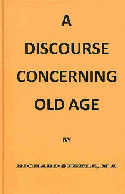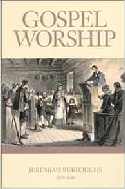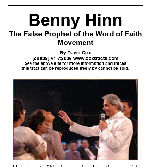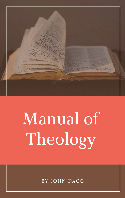Ads
Healing Spiritual Abuse: How to Break Free from Bad Church Experiences, Ken Blue, 1993. There is a great chapter on “Healed By Grace”. He says, “When we see that we are completely accepted by God solely through the life, death and resurrection of Jesus, all religious law loses its manipulative power over us.”
A review on this book is here…
In Healing Spiritual Abuse, Ken Blue offers a well-researched and insightful analysis of the dynamics of spiritual abuse. Books of this genre often focus on practical, behavioral aspects of abuse, and Blue definitely addresses this. For example, Blue offers this list of characteristics of an abusive church:
1. Abusive leaders base their spiritual authority on their position or office rather than on their service to the group. Their style of leadership is authoritarian.
2. Leaders in abusive churches often say one thing but do another. Their words and deeds do not match.
3. They manipulate people by making them feel guilty for not measuring up spiritually. They lay heavy religious loads on people and make no effort to lift those loads. You know you are in an abusive church if the loads just keep getting heavier.
4. Abusive leaders are preoccupied with looking good. They labor to keep up appearance. They stifle any criticism that puts them in a bad light.
5. They seek honorific titles and special privileges that elevate them above the group. They promote a class system with themselves at the top.
6. Their communication is not straight. Their speech becomes especially vague and confusing when they are defending themselves.
7. They major on minor issues to the neglect of the truly important ones. They are conscientious about religious details but neglect God’s larger agendas.
However, Blue excels at discussing the phenomenon of spiritual abuse from a theological and Scriptural point of view. The book is loaded with pastoral insights that are well founded and well expressed. A few excerpts illustrate this clearly:
In Luke 12:42 Jesus gives a picture of true spiritual authority in the form of a parable. He asks, “Who then is the faithful and wise manager, whom the master puts in charge of his servants to give them their food allowance at the proper time?” True leaders are not necessarily profoundly gifted or conspicuously talented; they need no exalted office; they need no titles to validate their words; they need no seat of Moses to support their effectiveness. All they need to do is be faithful and wise, serving food to their followers as it is needed (p. 32).
Both Ezekiel and Jesus condemned one fundamental error in the shepherds: they used the sheep rather than than served them. They acted as if the sheep existed to meet their needs rather than the other way around. When shepherds today look out over their congregations and see their people as church growth statistics, tithing units and workers in their programs, they follow the pastoral style that Jesus and Ezekiel prophesied against (p. 41).
Legalism is the great weapon of spiritual abuse. Multiplying religious rules to gain control over followers is authoritarianism’s primary tool. Legalism is an expression of leaders’ compulsion to seek security and predictability. If they can enforce an exhaustive list of dos and don’ts, they think, they will gain that security and predictability they crave (p. 44).
Jesus promises rest for all who are weary of trying to please religious leaders. He offers an easy yoke to all those laboring under a load of spiritual performance. If your religion is wearisome and burdensome, God’s answer is not a longer quiet time, a firmer commitment, attendance at one more conference or one more trip to the altar. God’s solution for spiritual tiredness is rest– rest in the loving acceptance of Jesus and his perfect load-carrying work for you (p. 59).
False shepherds will always give lip service to this mercy and grace, but will then undermine it in the body of their teaching and in their actions (p. 60).
A more common version of the same story is the pastor who berates the church, blaming them for low attendance at services or poor support for the church programs. Rather than look at the defects in his or her own leadership, the pastor focused attention on the flaws of the congregation. Such a person is more interested in keeping up appearances than in discovering what is actually wrong (p. 71)..
To sum up, I would say that if abuse is minor and rare, we should probably shrug it off. If it is significant, we should confront the perpetrator. If it is systemic, ongoing, unrelenting and well defended, we probably need to leave (p. 96).
So when we assess the integrity of a Christian leader or group, we do not look first at its motives, its aims or its moments of kindness. We look first and last at its fruit. If leaders constantly root their authority in an office rather than in servanthood, if they do everything for show, if they demand special privilege or titles, if they use words deceitfully, if they major on minors to the neglect of real pastoral needs, and if this behavior tears people down rather than builds them up, then such leaders must be confronted and changed– or abandoned (p. 99).
We have to be clear that if we are to have anything like Christian fellowship with those who have hurt us, they must at some point acknowledge their sin and repent of it. No true relationship between Christians can exist without this cleansing. We can forgive without their repenting, and this will free us from the bondage of ongoing bitterness, but we will not have a reconciled relationship with them until they repent (p. 100-101).
He (a former spiritual abuser) explained how in his first church he quickly gathered about him those parishioners who met his needs, those who supported him uncritically. “In time,” he said, “I established a class system, with my supporters at the top and those who posed a threat to my leadership at the bottom. This system aided me in the delusion that I was doing the right things (p. 110).”
The second classic type of spiritual abuser is the heroic, grandiose or messianic narcissist who is obsessed by a desire to be someone great or to do something unprecedented for God. Carrying out this fantasy requires the cooperation of others and access to their money. Like the first type, this leader may not consciously wish to hurt anyone; but other are hurt as they are used for the leader’s and God’s “higher purposes (p. 111).”
In order to achieve the public support he needs, these leaders make extraordinary claims for themselves or have others make them in their behalf. Such claims may include a special anointing, unusual personal sacrifice, unprecedented encounters with God, unique training, a singular teaching or leadership gift, a revelation of truth that is not available to others, or secret knowledge of God’s end-times purposes. These and other claims imply that God has a special calling on this leader, and so it is the “unspecial” people’s duty to admire and follow him, which they often do in droves (p. 113).
Once this attitude is rooted in a group, the combination of pride and fear keeps followers in formation. Everyone wants to feel special, and some get hooked on the exhilaration of being part of an elite. Others fear leaving lest they miss God’s will and be accused of deserting his special calling (p. 114).
Many Christians say they have heard, understood and believed the gospel. But when they continue to subject themselves to the legalistic manipulation of spiritual abusers, we must assume that the Good News has not yet sunk in fully. For some this takes time. So we must continually reinforce the truth that we have in fact died to the law and are no longer obligated to it. Meditating on biblical passages which assure us of the radical nature of our acceptance by God through Jesus can be helpful (p. 127).
Healing Spiritual Abuse is recommended as an insightful and helpful resource in understanding and breaking free from unhealthy church situations.
A similar themed article is here Healing Spiritual Abuse “‘Overemphasizing Spiritual
Abuse?’ a Response to Charles Clark of Patheos.com” Charles Clark attacks Fundamentalism as the primary culprit, but the article rejects that.

Steele A Discourse Concerning Old-age is a 109 page work on Christian Counsel to those who are aged, looking at different aspects of old age from a Christian point of view. This is an old work, but sound advice from Scripture is timeless.
PDF: Steele A Discourse Concerning Old-age.PDF
OpenOffice: Steele A Discourse Concerning Old-age.odt
theWord: Steele A Discourse Concerning Old-age.twm
eSword: Steele A Discourse Concerning Old-age.topx
MySword: Steele A Discourse Concerning Old-age.mybible







